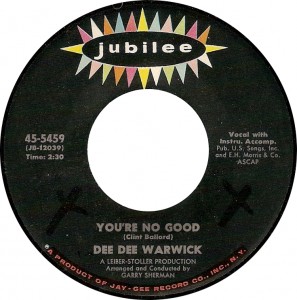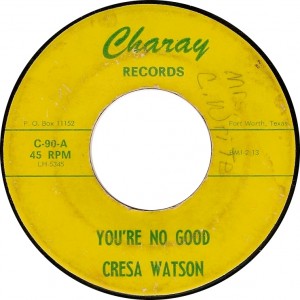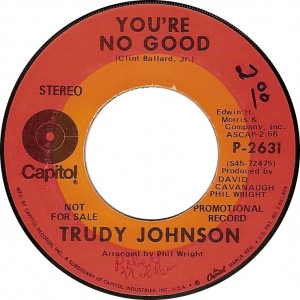“You’re No Good” was written by one Clint Ballard (1931-2008), an El Paso-born musician, songwriter-for-hire and band manager who enjoyed his greatest success in the mid-’60s. “You’re No Good” is one of Ballard’s best-known, if not best, compositions. (Other well-known Ballard works include “The Game of Love,” a big 1965 hit for Wayne Fontana & the Mindbenders and “I’m Alive,” a UK hit for the Hollies the same year. Additionally, Ballard’s songs would enjoy smaller-scale success in the hands of Jimmy Jones, Ricky Nelson, the Zombies and Frankie Laine, among others.)
Like any number of contemporary smashes – Ray Charles’s “Unchain My Heart,” Bob & Earl’s “Harlem Shuffle” and Solomon Burke’s “Cry to Me” come to mind – “You’re No Good” brought uptown pop appeal to a dark R&B sound.
It was helped in no small way by the steely, sophisticated resolve of the lyrics, and furthermore by the perfection of the song’s musical composition. Realized early on in sleek arrangements by Lieber and Stoller (for Dee Dee Warwick, see below) and by Calvin Carter (for Betty Everett, who made the number a hit in late ’63 for Vee-Jay Records), a dark, propulsive beat set the standard for and shape of all subsequent recordings, including a fairly faithful, if limp, reading by Linda Ronstadt, for whom it was a hit in 1974.
It’s just one of those durable compositions. Like “Summertime,” or “Fever,” I suspect that there’s a bad version of “You’re No Good” somewhere out there, but I’ve yet to hear it.
 1. Dee Dee Warwick, You’re No Good (Jubilee 45-5459)
1. Dee Dee Warwick, You’re No Good (Jubilee 45-5459)
It would remain Dee Dee Warwick’s burden to play little sister to an international star.
Born Delia Warwick in 1945 into a musical family in Newark, New Jersey – Dee Dee’s sister was, famously, Dionne Warwick. As part of the group the Gospelaires, Dionne and Dee Dee – along with their aunt Cissy Houston – would grow up performing together in the local church.
The early ‘60s brought a tide of bright gospel talents over into the pop world and the nascent market for what was then coalescing as soul music. The teenaged Warwick’s musical predilections would be marshaled into her work as a back-up vocalist – again, often alongside sister Dionne – on many early ‘60s R&B sessions, including a number of recordings for the powerhouse indie label Atlantic Records.
This studio work led to her debut as a solo artist, 1963’s “You’re No Good.” Released on the prolific New York City indie Jubilee Records, produced by the then-unstoppable songwriting-production team of Mike Lieber and Jerry Stoller, this, in addition to being the first recording of “You’re No Good,” would become a decent-sized hit for Warwick. It would in turn be a much bigger hit for singer Betty Everett a few months later. But for many, myself included, this – with Dee Dee turning in a deadly performance, not to mention the very early use of the fuzztone guitar – is the definitive version of “You’re No Good.”
Clearly the talent was there, but, unlike her sister, Dee Dee neither seemed to possess the proclivity for the show business spotlight nor the great fortune of landing herself as one of the most visible voices for the Burt Bacharach and Hal David songwriting team. More hits on different labels would ensue for Dee Dee – including 1965′s “We’re Doing Fine” on the Blue Rock label, “I Want to Be With You” and “I’m Gonna Make You Love Me,” both in 1966 for Mercury Records, and “She Didn’t Know,” recorded for Atco Records in 1970. But, as with many in the early generations of crossover R&B artists, the early ’70s onwards were a time of slowly diminishing returns, bungled commercial opportunities and decreasing exposure for Warwick.
Dee Dee Warwick passed away in 2008.
 2. Cresa Watson, You’re No Good (Charay C-90-A)
2. Cresa Watson, You’re No Good (Charay C-90-A)
Someday I suspect the Cresa Watson story will be revealed but, alas, this is not that moment.
Some of the Cresa Watson mystery can be attributed to her association with Charay Records, one of a family of local labels (including Soft, Shalimar, Le Cam and Zuma, among others) operated out of Fort Worth by the infamous record hustler Major Bill Smith.
It wasn’t that The Maj didn’t release good stuff – his was an incredible discography of soul, R&B, garage bands and pop – it was that that the good stuff tended to get recycled endlessly, and shamelessly. The Maj’s business practices meant that the same compositions (often credited spuriously to his own name) got circulated amongst many of his labels’ artists and that, similarly, backing tracks were reused multiple times with different overdubbed vocals or musical parts. Sometimes the exact same recording would be credited to several artists, and sometimes different recordings would be given the same label release number. For Major Bill ultimately the name of the game was wringing out as much royalty dough as possible. Another 45 could always be released.
None of this should obscure the fact that her cumulative handful of actual recordings, while scattered across a much larger number of 45s, reveal in Watson a young and expressive soul voice. Among her releases perhaps the best known is the legendarily suicidal “Dead,” also released on Charay Records. (“Dead” is a confounding mystery unto itself. In typical Maj-style, it was released multiple times as both a vocal and instrumental with different overdubs, and credited at least a dozen different ways, this version included.)
But “You’re No Good” is by far my favorite Watson-related record. Released in 1969, though likely recorded a bit earlier, this, in Watson’s hands, is the darkest of this week’s three versions, its raw, churning R&B combo instrumentation giving it an appealingly weedy reek.
 3. Trudy Johnson, You’re No Good (Capitol P-2631)
3. Trudy Johnson, You’re No Good (Capitol P-2631)
From North Richmond, California, vocalist Johnson grew up in the ‘50s singing gospel music before crossing over, as so many of her generation did, into the R&B, blues and pop world.
Johnson, by all accounts, first attracted significant local press in the ‘60s for her appearances with the Spiders, an interracial soul group and mid-‘60s fixture of the East Bay R&B circuit. Contemporary accounts detail her magnetic presence and statuesque height.
This was Johnson’s debut disc. “You’re No Good,” and its bluesy a-side “Your Good Thing (Is About to End)” (a big hit for Lou Rawls several months earlier), were produced and arranged in 1969 by longtime arranger Phil Wright and future Capitol Records president David Cavanaugh – frequent studio collaborators themselves, with close ties to Capitol’s pop and jazz stable. Despite its flawless, classy production – a hallmark of that grand era of Capitol’s soul and R&B programme – and Johnson’s vital performance, the 45 made little progress in the charts.
Johnson has continued to perform in California as a versatile jazz, pop, R&B and jazz vocalist in the years since, though has remained somewhat out of the national spotlight, and has recorded only sporadically (including an obscure mid-‘70s 45 date with Lionel Hampton). You can learn more about Johnson here.










![Morning-Noon & Night, I’ve Gotta Get a Message to You (Peace [United Under One] 6744) Morning-Noon & Night, I’ve Gotta Get a Message to You (Peace [United Under One] 6744)](http://web.archive.org./web/20170702031258im_/http://officenaps.com/wp-content/uploads/2010/10/morningnoonandnight_ivegottagetamessagetoyou-298x300.jpg)







